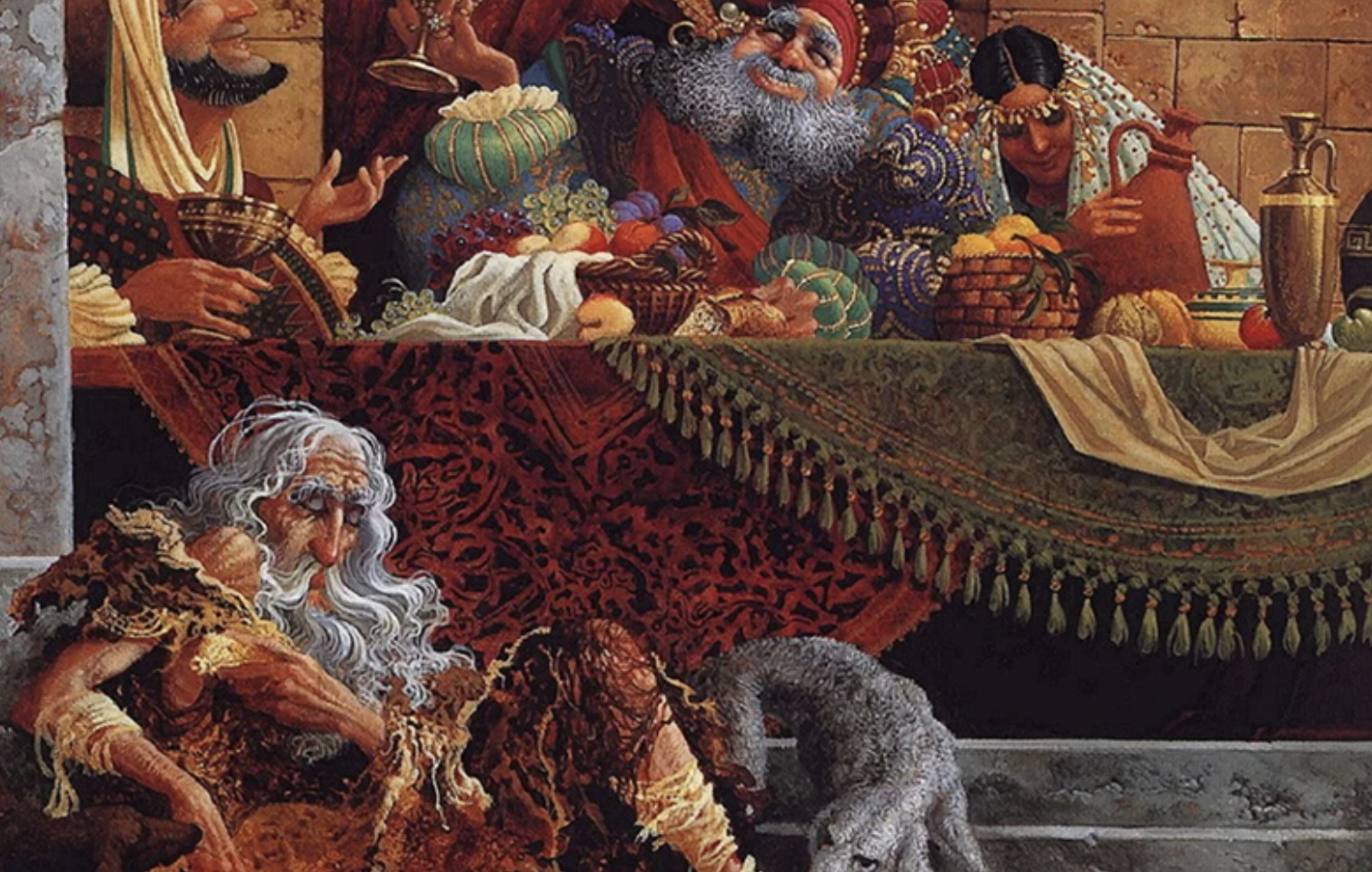
In the previous century, it was the generally accepted thing to pray for the dead. Funerals were for the dead, but over time, that focus changed and, today, funerals are for the grieving family and friends. We would certainly pray for the dying, but once they had passed away, our focus would then change to the present. Some might question whether this contact with the dead isn’t portrayed in the story of the Rich Man and Lazarus from Luke 19.

Here we have Lazarus, a poor man, beset with skin sores, laying upon Abraham’s bosom, with a Rich Man looking up from what is deemed to be Hades, the underworld – despite some of the English translations stating that it is to be Hell. There is a conversation between them both – where both are deemed to be ‘dead’ from life on Earth.
Lazarus is not the name accepted for this story, which is derived from the Hebrew אלעזר, Elʿāzār (Eleazar) meaning “God has helped”. Eleazar was a common name in that genre.
Jesus tells the Luke 16 story shortly after speaking of the Prodigal son – prodigal meaning ‘recklessly spending’. Recall John speaks of Jesus raising his friend Lazarus from the dead when there was intensified opposition from the Jewish leadership (John 11.45-54; 12.9-10). Could these stories actually originate from the same Egyptian myth, and in particular linked to Osiris?
Setme and Si-Osiris
There is a story, a tale of Setme and Si-Osiris (Prince Khamuas and Si-Osiri), possibly originating from 1550–1292 BCE, albeit recorded in the early 1st C.

THE SECOND STORY OF KHAMUAS
which concludes “(The law) was that he who was found to have done more evil deeds than good ones was thrown (?) to Ama of the Lord of Amenti, (who) destroyed his soul (and) his body and did not allow him to breathe ever again. (The law) was that he who was found to have committed more numerous good deeds than evil deeds was taken to the gods of the council of the Lord of Amenti, and his soul went to heaven with the noble spirits. (The law) was that he who was found to have committed as many good deeds as evil deeds, was taken amongst the excellent (?) spirits that serve Sokari-Osiris.” Bart Ehrman backs this theory up here.
What does this tell us?

This was an ancient Egyptian myth of the netherworld, and a conversation between the two men: one rich and the other poor. It resembles the Rich Man and Lazarus story from Luke 16. It’s odd that this tale is not introduced as a parable, as many other tales are within the Gospel according to Luke. Whereas, the author is keen to criticise the rich, here the issue is not how rich the man was, but how he treated the poor. Their separation seems permanent as nothing can pass from here to there. Jermias1 writes, “Alexandrian Jews brought this story to Palestine, where it became very popular as the story of the poor scholar and the rich tax-collector Bar Ma’jan. That Jesus was familiar with the story is shown by his using it in the parable of the Great Supper.” Jews repackaged, or recontextualized stories, scriptures, and poems to fit a certain particular point they were trying to convey. This is seen throughout the New Testament, where authors utilise stories from the Hebrew Scriptures (or OT), and use them in different ways to teach about Jesus. So, did Jesus take this rather old Egyptian story to talk about the reversal of fortunes in the afterlife?
Perhaps it’s not about praying for the dead, as suggested to me, but again Luke seeking to encourage the readers (listeners) that we should treat all as we would like to be treated. Love the person in front of us.
- Rediscovering the Parables, by Joachim Jeremias, p.145 ↩︎
I have enjoyed the dialogue
Agreed that it is not bad to be rich, but what matters is how we treat the poor. What if, in the process of helping the poor, one were to lose one’s rich possessions? Probably, that’s what Jesus meant in Luke 18:25, that “it is easier for a camel to go through the eye of a needle than for a rich man to enter the kingdom of God” (Jesus and the rich young man). Treating others well is okay for many until it doesn’t take away their own convenience. Forget money, even time these days is so precious for all of us that we do not want to spend it with people in need or with those who want to be heard. Loving the person in front of us at their own cost is what is probably difficult for people.
Agreed.
So, that memorable phrase is probably just an exaggerated expression not meaning anything literal. I totally agree that money isn’t the real focus but what can we give? Time, wisdom, guidance, support : the list goes on.
Love that last sentence.
Probably, we need to find the right balance between serving others as well as maintaining ourselves to fit into this world.